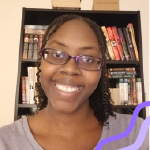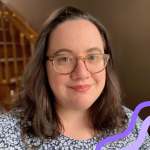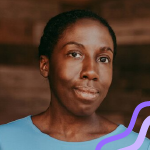How to Build Inclusive Collections

Learn to create library collections that are inclusive and reflect a diverse range of people, stories, and experiences.
Course Description
Live sessions via Zoom:
Thursdays, Oct. 24, 31 and Nov. 7, 2024 from 2:00 to 4:30 pm ET
(recordings accessible for 6 months)
Asynchronous Workshop:
Project-based assignments with expert feedback over 3 weeks
Library collections must be diverse and inclusive, offering windows into and reflections of the vast array of people, stories and experiences that make up our world. In this course, you’ll learn from a group of experts as they explore key concepts essential to cultivating and promoting inclusive collections. You’ll gain the tools to conduct a diversity and inclusion audit of your collections, and hear about ways to include wider perspectives from and about LGBTQIA+ people, Black, indigenous, and people of color, and historically underrepresented ethnicities, cultures, and religions. You’ll learn how to ensure that your collections are more reflective of the diversity of your community and the larger world and how to establish policies for keeping your inclusive collections safe against book challenges.
The live sessions run on Thursdays, Oct. 24, 31 and Nov. 7, 2024 from 2:00 to 4:30 pm (recorded for on demand viewing) with an asynchronous workshop over 3 weeks. Don’t miss this opportunity!
PRO TIP: Get our best rates when you register a group of 3 or more!
When you sign up early, you’ll have immediate access to our Early Access On-Demand Resources—a series of webinars from past Library Journal and School Library Journal courses—to explore at your own pace
Learning Outcomes
After you leave this course, you should have the ability to:
-
Assess current library collections, book promotions, and displays through a diverse lens in order to assess gaps in collections and service areas
-
Understand key diversity and cultural literacy concepts such as white privilege, unconscious bias, cultural appropriation, and intersectionality
-
Recognize common problematic stereotypes, tropes, and microaggressions in media
-
Assess the diversity and inclusiveness of current collection development and readers advisory practices
-
Plan and execute a diversity audit
-
Diversify collections and displays with cultural humility and confidence
Who should take this course?
This course is for any librarian who influences or manages library collections and materials.
Course Features
This will be a 3-week online course and will include:
-
Live sessions: Guest speaker presentations by leaders in their field. (All sessions are recorded for on demand access for six months after the course ends.)
-
Facilitated discussions: Audience participation in Q&A and discussion with guest speakers.
-
Interactive working sessions: Optional breakout groups during live sessions to practice skills with peers.
-
Asynchronous workshop: Project-based weekly assignments to connect what you’re learning to your professional life. Includes written feedback from an expert in the field who functions as the workshop facilitator, as well as peer conversation via discussion forums.
-
Early access on-demand resources: Access to a series of past live session archives from Library Journal and School Library Journal courses to explore at your own pace.
-
Online Classroom: The virtual learning platform that holds all course content and is accessible for six months after the course ends.
Expected time commitment
If you attend or watch the recordings of all live sessions and participate fully in the asynchronous workshop, you'll spend approximately 2-4 hours per week on this course. You'll earn 15 hours of PD credit and a Library Journal certificate of completion.
On-demand access
All live guest speaker sessions are recorded and available on-demand for six months following the initial broadcast as a part of your purchase.
Certificate of completion
Complete the course and earn 15 professional development credit hours. We provide a certificate that is emailed to you.
Accessibility
All guest speaker sessions feature live captioning and are made available on demand after the initial broadcast. Please email libraryjournal@edmaker.co upon registration if you require any special accommodations and we will make our best efforts to facilitate them.
Support
For support with online courses, please contact libraryjournal@edmaker.co.
Group Rates
We offer discounts for groups of 3 or more. Groups have the option to collaborate in the same workshop group, where discussions and project-based assignments receive feedback from an experienced librarian.
For larger groups of 15 or more, we offer the option to apply group rates across multiple courses to receive significant discounts. For more information, select “Bulk Course Credits Packages” in the form below.
By registering for this event you confirm that you have read and agree to our Code of Conduct.
Week 1: Thursday, October 24, 2024
Establishing goals and priorities: Defining inclusive collections and learning how to build and maintain them
Session 1 | 2:00-2:45 pm ET
Creating Inclusive Library Collections
While it’s important to ensure our collections are diverse, what does it mean to ensure they are truly inclusive? In this session, we’ll discuss why moving toward inclusive library collections is a crucial step in advancing equity and justice at our institutions. You’ll learn from an expert how to assess your collections as they are now, and hear what considerations to make when ordering and weeding. We’ll also touch on how to address some of the challenges to materials in your collection and how to advocate for underrepresented voices that must be included.
Speaker:
|
|
Kymberlee Powe, Children and YA Consultant, Connecticut State Library Division of Library Development |
Break | 2:45-3:00 pm ET
Session 2 | 3:00-3:45 pm ET
Conducting a Diversity Audit of Your Collections and Ordering: Where to Start
In this session, we’ll discuss the process of conducting a diversity audit of both your collections and your ordering. You’ll learn how to plan a diversity audit, which salient data points should be included, how to gather the requisite information, and how to set goals to address gaps. We’ll discuss the step-by-step process for establishing your diversity audit and how to make diversity and inclusion natural and ongoing parts of collection management and promotion.
Speaker:
|
|
Dontaná McPherson-Joseph, Collection Management Librarian, Oak Park Public Library (IL) |
Session 3 | 3:45-4:15pm ET
Metrics for Inclusive Collections: Goals, Benchmarks, and Evaluation
What are realistic goals to set for creating inclusive collections? What kinds of metrics and data are most helpful in evaluating whether you are reaching your benchmarks? This session will discuss data-driven metrics to help your processes as you develop your collection, weed, and conduct a diversity audit.
Speaker:
|
|
Wendy Bartlett, Collection Development & Acquisitions Manager, Cuyahoga County Public Library |
Workshop Explanation & Q&A | 4:15-4:30pm ET
An introduction to this week’s assignment and an overview of what to expect from the online workshop in this course
Week 2: Thursday, October 31, 2024
Preparing for your collection assessment: Identifying harmful – and amplifying authentic – stories in our library materials
Pre-Session: Workshop Explanation | 1:50-2:00 pm ET
An introduction to this week’s assignment and an overview of what to expect from the online workshop in this course
Session 1 | 2:00-3:15 pm ET
Assessing and Revising Your Collection Management Policies to Protect Your Collections and Yourself
As you create more inclusive collections, it’s critical to assess your current collections policies so that you are equipped to handle both informal and formal book challenges and have conversations with patrons that promote your inclusive and affirming materials. Having clear procedures, protocols, and messaging in place can provide a strong foundation for collection development work as well as protect frontline staff. Assessing your policies and procedures and how they are communicated with your community is a key piece of your advocacy work.
Speaker:
|
|
Kelly Jensen, Editor, Book Riot |
From Margin to Center: A Collection Development Deep Dive, Part 1
Not all representation is good representation, and in this series of enlightening sessions, you’ll learn how to identify the harmful and amplify the affirming. You will hear from several experts in the field about the ways that specific identities are portrayed in mainstream media, their traditions misunderstood or misrepresented, and their stories appropriated by cultural outsiders. You’ll learn how to spot problematic stereotypes and tropes and how to avoid perpetuating such depictions. You’ll walk away with the tools you need - and a trove of resources - to build a more inclusive and affirming collection at your library or institution and become an advocate for storytelling that moves beyond representation and towards real inclusion.
Session 1 | Black Stories in Library Collections | 3:15-3:45 pm ET
Speaker:
|
|
Jennifer Baker, Writer, Editor, Advocate, and Founder, Minorities in Publishing podcast |
Break | 3:45-4:00 pm ET
Session 2 | Muslim Stories in Library Collections | 4:00-4:30 pm ET
Speakers:
|
|
Ariana Hussain is a teacher-librarian at the Blake School in Hopkins, Minnesota. |
|
|
Hadeal Salamah, (she, her) currently serving on the 2024 Walter Dean Myers Awards Committee, co-founder of Hijabi Librarians and reviewer |
Week 3: Thursday, November 7, 2024
Beginning your audit and defending inclusive collections
Pre-Session: Workshop Explanation | 1:50-2:00 pm ET
An introduction to this week’s assignment and an overview of what to expect from the online workshop in this course
From Margin to Center: A Collection Development Deep Dive, Part 2
Not all representation is good representation, and in this series of enlightening sessions, you’ll learn how to identify the harmful and amplify the affirming. You will hear from several experts in the field about the ways that specific identities are portrayed in mainstream media, their traditions misunderstood or misrepresented, and their stories appropriated by cultural outsiders. You’ll learn how to spot problematic stereotypes and tropes and how to avoid perpetuating such depictions. You’ll walk away with the tools you need - and a trove of resources - to build a more inclusive and affirming collection at your library or institution and become an advocate for storytelling that moves beyond representation and towards real inclusion.
Session 1 | Native American Stories in Library Collections | 2:00-2:30 pm ET
Speaker:
|
|
Stacy Wells, MLIS: Youth Librarian at Southlake Public Library, Executive Assistant for the American Indian Library Association, Steering Committee member for the North Texas Teen Book Festival |
Session 2 | Disability Stories in Library Collections | 2:30-3:00 pm ET
|
|
Dan Freeman, Senior Assistant Director for Curriculum Policy and Support at the College of Arts and Sciences, Indiana University-Bloomington |
Break | 3:00-3:10 pm ET
Session 3 | Queer Stories in Library Collections | 3:10-3:40 pm ET
|
|
Carson Williams, (he, him) Collection Development Librarian, Cornell University (NY) |
Session 4 | Inclusive Publishers | 3:40-4:05 pm ET
Learn about specific publishers who are publishing unique and inclusive books you might consider adding to your collections.
|
|
Jenny Choy, Marketing Director at Lee & Low Books |
|
|
Antonio Gonzalez Cerna, Marketing Director at Levine Querido |
Session 5 | 4:05-4:30 pm ET
Sustaining Collection Assessment Momentum
Collection assessment work is never done, and in this session, we’ll discuss what is required to build and sustain momentum for this iterative process. You’ll come away with tools and strategies for assessing and understanding the impact of your initial auditing approach, as well as considerations for expanding and refining for the future.
Speaker:
|
|
Kymberlee Powe, Children and YA Consultant, Connecticut State Library Division of Library Development |
Online Course Preview
A preview of how we build your library skills and bring inspiration to your projects with our online learning experience.
Course Format
One-Week Timeline (Course Runs 3+ Weeks)
|
DAYS 1-2 On-Demand |
DAY 3 2 hours |
DAYS 4-7 1-2 hours (optional) |
 |
 |
 |
|
PRE-LIVE SESSION - Resources - Discussions - Bonus Content |
LIVE SESSIONS - Guest speakers via webcast - Facilitated discussions - Recordings available for 6 months |
ASYNCHRONOUS WORKSHOP - Project-based weekly assignments - Written feedback from a facilitator - Peer conversation via discussion forums |
Course Features

Live session with Andrea Blackman and Tasneem Ansariyah Grace |
Live Guest Speakers Sessions
|
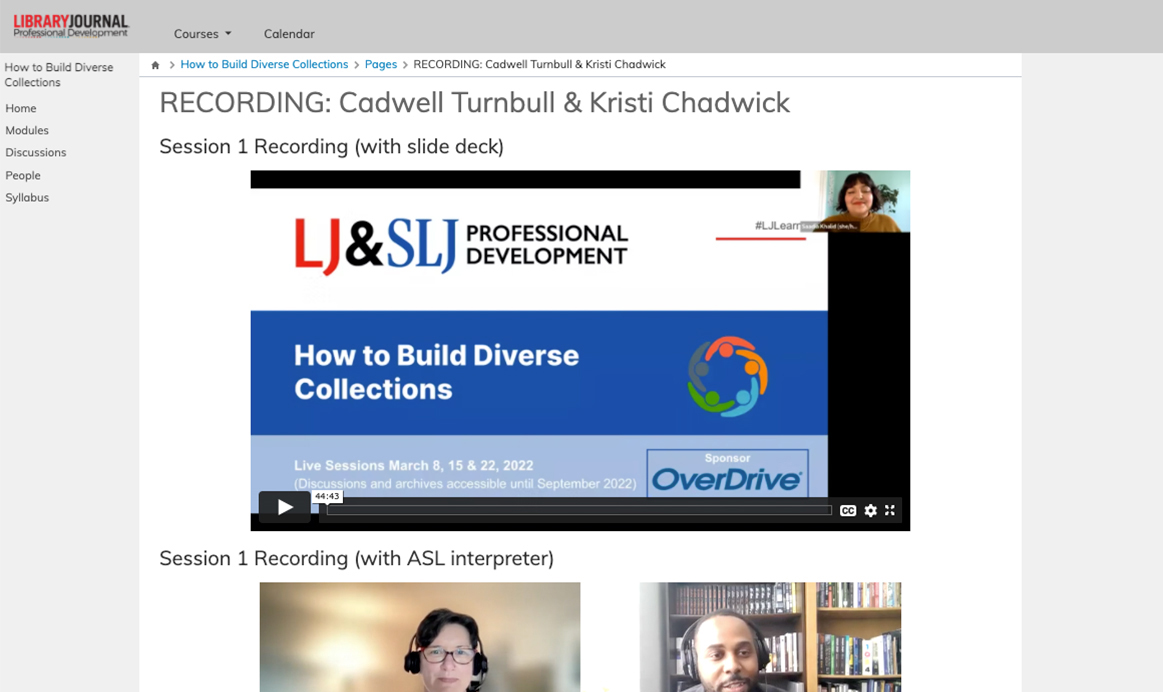
Recordings of guest speakers |
Recordings Available On Demand
|

Asynchronous workshop |
Online Classroom + Asynchronous Workshop
|
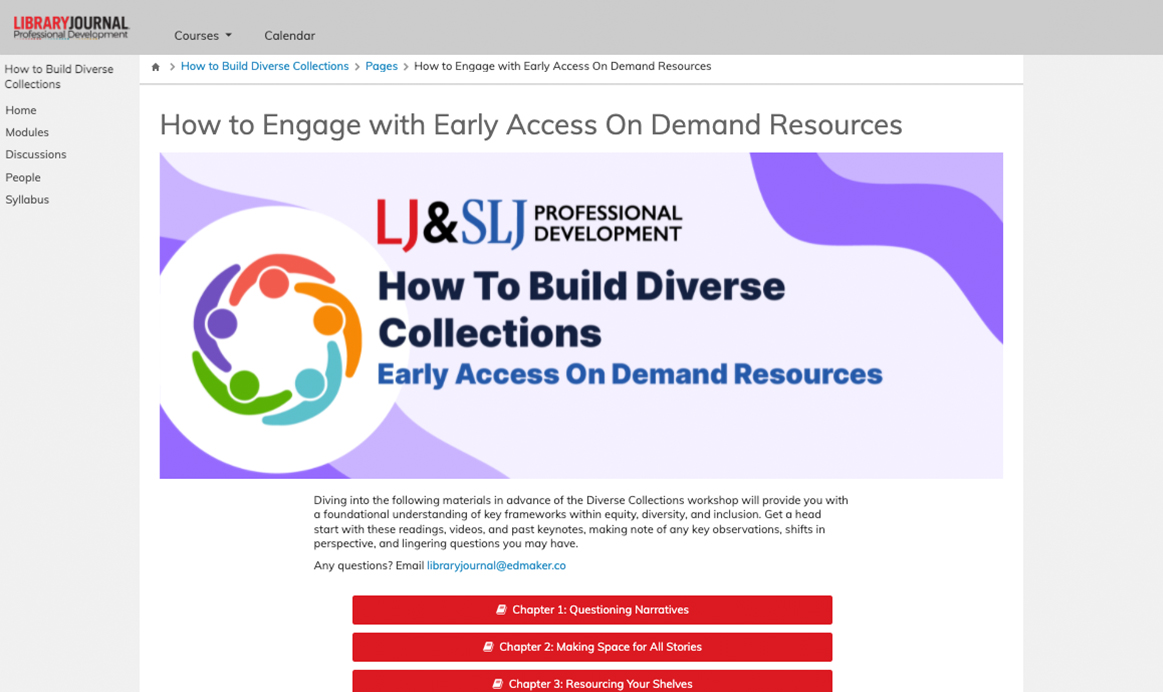
Early Access On-Demand Resources |
Early Access On-Demand Resources
|
ALREADY A SUBSCRIBER? LOG IN
We are currently offering this content for free. Sign up now to activate your personal profile, where you can save articles for future viewing


